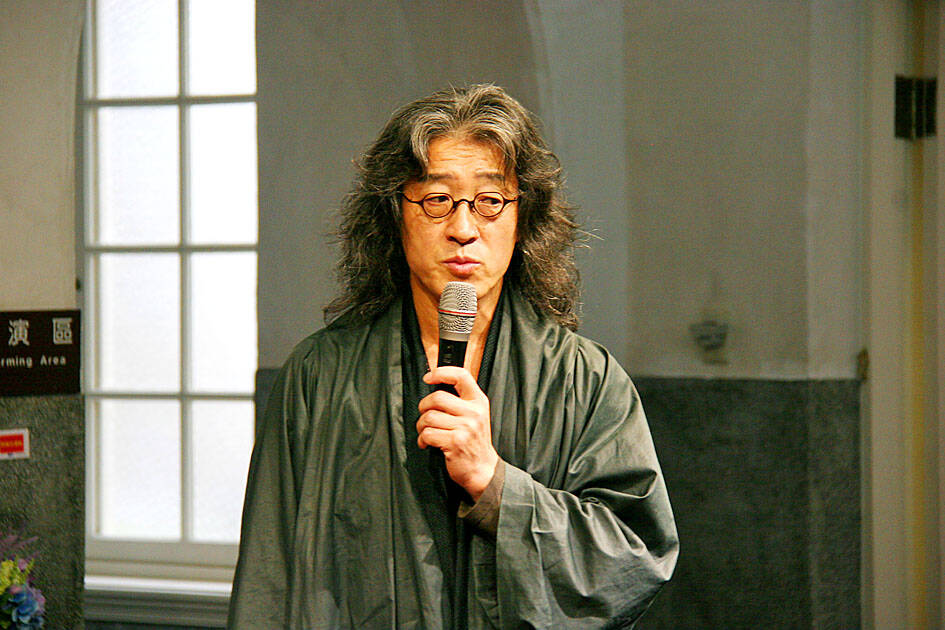A writer for the Netflix show Wave Makers (人選之人—造浪者) has accused exiled Chinese poet Bei Ling (貝嶺) of sexually assaulting her when she was a student at Chinese Culture University.
Bei has denied the accusations, describing them as a “fabrication.”
Writer Chien Li-ying (簡莉穎), who published an account of the alleged assault on social media on Friday, accused Bei of groping her and placing her hand down his pants while sitting on an air bed at the poet’s home when she was in her junior year at the university.

Photo: CNA
Chien said she had contacted Bei via e-mail because he was a friend of writer Susan Sontag, and she had planned a project to direct and stage Sontag’s Alice in Bed.
Before the incident, Bei had sent her a box of Sontag’s books, which had convinced her that he was trying to help with her project, she said.
In response to media queries, Bei said Chien’s account was a “pure fabrication.”
“She sought to impose experiences she had had with others or things that never happened on me,” he said.
Bei denied ever owning an air bed or sending Chien a box of Sontag’s books, adding that he did not recall Chien ever directing Alice in Bed, as the Taiwanese adaptation had a male director.
Victims of sexual harassment coming forward to confront their abusers indicates that society is moving forward, Bei said, adding that he “fully supported” such actions.
However, he said, if Chien tried to “pressure” him with something he could not be held accountable for, he “reserved the right to seek legal recourse to defend his reputation.”
Bei was a leader of underground literary and cultural movements in the 1980s prior to the 1989 Tiananmen Square protests.
He was arrested by Chinese authorities in 2000 for publishing an edition of the Tendency (傾向) literary journal, which he cofounded, on a charge of “illegally publishing a foreign literary publication.”
Bei’s arrest triggered an international backlash, and he was released two weeks later and exiled to the US.
He moved to Taiwan in 2016 and obtained permanent residency in 2021.

Taiwanese can file complaints with the Tourism Administration to report travel agencies if their activities caused termination of a person’s citizenship, Mainland Affairs Council Minister Chiu Chui-cheng (邱垂正) said yesterday, after a podcaster highlighted a case in which a person’s citizenship was canceled for receiving a single-use Chinese passport to enter Russia. The council is aware of incidents in which people who signed up through Chinese travel agencies for tours of Russia were told they could obtain Russian visas and fast-track border clearance, Chiu told reporters on the sidelines of an event in Taipei. However, the travel agencies actually applied

Japanese footwear brand Onitsuka Tiger today issued a public apology and said it has suspended an employee amid allegations that the staff member discriminated against a Vietnamese customer at its Taipei 101 store. Posting on the social media platform Threads yesterday, a user said that an employee at the store said that “those shoes are very expensive” when her friend, who is a migrant worker from Vietnam, asked for assistance. The employee then ignored her until she asked again, to which she replied: "We don't have a size 37." The post had amassed nearly 26,000 likes and 916 comments as of this

New measures aimed at making Taiwan more attractive to foreign professionals came into effect this month, the National Development Council said yesterday. Among the changes, international students at Taiwanese universities would be able to work in Taiwan without a work permit in the two years after they graduate, explainer materials provided by the council said. In addition, foreign nationals who graduated from one of the world’s top 200 universities within the past five years can also apply for a two-year open work permit. Previously, those graduates would have needed to apply for a work permit using point-based criteria or have a Taiwanese company

The Shilin District Prosecutors’ Office yesterday indicted two Taiwanese and issued a wanted notice for Pete Liu (劉作虎), founder of Shenzhen-based smartphone manufacturer OnePlus Technology Co (萬普拉斯科技), for allegedly contravening the Act Governing Relations Between the People of the Taiwan Area and the Mainland Area (臺灣地區與大陸地區人民關係條例) by poaching 70 engineers in Taiwan. Liu allegedly traveled to Taiwan at the end of 2014 and met with a Taiwanese man surnamed Lin (林) to discuss establishing a mobile software research and development (R&D) team in Taiwan, prosecutors said. Without approval from the government, Lin, following Liu’s instructions, recruited more than 70 software